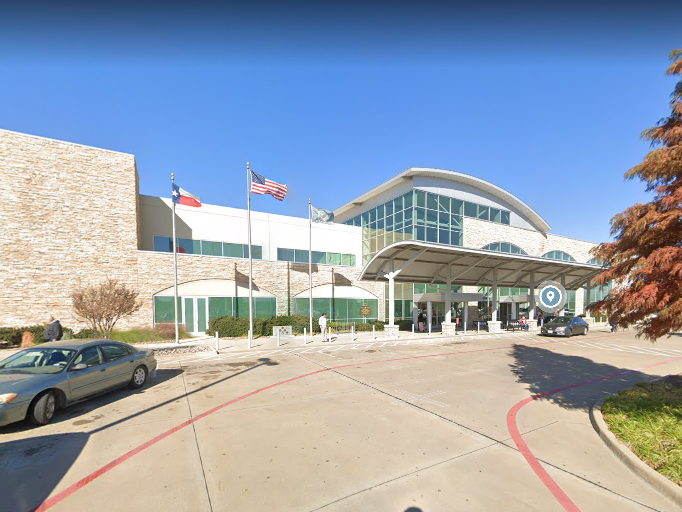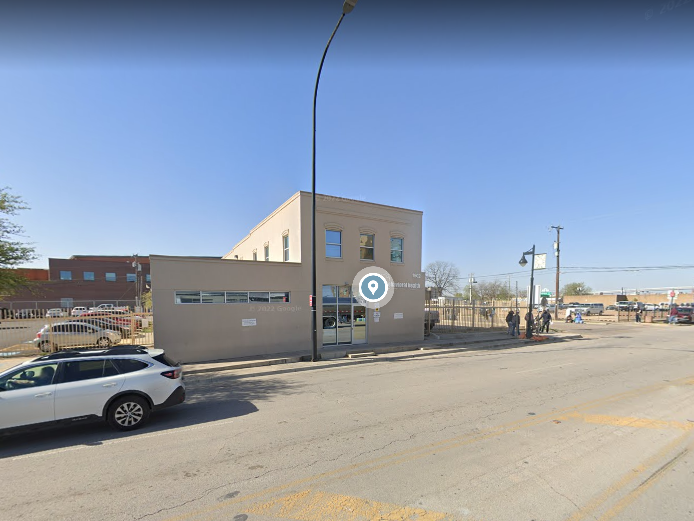LAAM and Methadone Program (LAMP)

Contact Details
-
Name:LAAM and Methadone Program (LAMP)
-
Address:2201 SE Loop 820
Fort Worth, TX - 76119 -
Phone:817-730-0004
-
Email:
-
Instagram:
-
Website:
Description
There are currently state and federally funded or sponsored drug and alcohol treatment centers in the state of Texas
Questions & Answers
Help others like you find out more about LAAM and Methadone Program (LAMP). Do you know the answers to any of these questions? Contribute now and help others like you.
What kinds of care do they offer?
-
Substance use treatment
Refers to a broad range of activities or services, including identification of the problem (and engaging the individual in treatment); brief interventions; assessment of substance abuse and related problems including histories of various types of abuse; diagnosis of the problem(s); and treatment planning, including counseling, medical services, psychiatric services, psychological services, social services and follow-up for persons with alcohol or other drug problems (Institute of Medicine, 1990).
-
Treatment for co-occurring substance use plus either serious mental health illness in adults/serious emotional disturbance in children
Housing for individuals recovering from substance abuse that is designed to provide a drug and alcohol-free living environment and appropriate support services to facilitate movement to independent living. Such housing includes transitional living, sober houses, sober living, recovery houses, and 3/4 houses.
What types of opioid treatment do they provide?
-
Methadone maintenance
Comprehensive treatment program that involves the long-term prescribing of methadone as an alternative to the opioid on which the client was dependent.
-
Buprenorphine maintenance
-
Federally-certified Opioid Treatment Program
The process by which the SAMHSA Center for Substance Abuse Treatment, Division of Pharmacologic Therapies determines that an OTP is qualified to provide opioid treatment under 42 CFR Part 8. For additional information on the OTP certification process, see http://www.samhsa.gov/medication-assisted-treatment/opioid-treatment-programs/.
-
Prescribes buprenorphine
What opioid medications are used in treatment?
-
Buprenorphine used in Treatment
Buprenorphine is used in medication-assisted treatment (MAT) to help people reduce or quit their use of heroin or other opiates.
-
Naltrexone used in Treatment
-
Methadone used in Treatment
What specific pharmacotherapy treatments do they provide?
-
Naltrexone (oral)
-
Naltrexone (extended-release, injectable)
-
Methadone
-
Nicotine replacement
Administers nicotine to the body by means other than tobacco, without other harmful chemicals found in tobacco. Common forms of nicotine replacement therapy are nicotine patches, nicotine gum or lozenges, nasal spray and inhaler. The goal of nicotine replacement is to prevent cravings in a tobacco user, allowing the person to abstain from tobacco.
-
Non-nicotine smoking/tobacco cessation
Are medications that do not contain nicotine but act on the brain to reduce a person's craving for tobacco. Some common medications are Bupropion (Zyban, Wellbutrin), and Nortriptyline (Pamelor). Medications are often prescribed in conjunction with behavioral counseling or support groups to provide the best chance for achieving long-term smoking abstinence. (http://www.mayoclinic.com)
-
Acamprosate (Campral?)
Acamprosate is used in combination with psychological and social treatments as part of a full alcoholism treatment plan. It is recommended for people who are motivated to reach alcohol abstinence rather than to simply decrease drinking amounts.The mechanism of action is not exactly understood but it seems to help reduce cravings by reducing the positive response to drinking and reducing cravings. It is important to note that Campral does not help relieve the symptoms of alcohol withdrawal.
-
Disulfiram
-
Buprenorphine with naloxone
A prescription medication that combines buprenorphine (which helps relieve symptoms of opiate withdrawal) and naloxone (reverse the effects of narcotics) used to treat opioid addiction.
-
Medication for mental disorders
What types of treatment approaches do they offer?
-
Cognitive behavioral therapy
Involves recognizing unhelpful patterns of thinking and reacting, and then modifying or replacing these with more realistic or helpful ones. The therapy can be conducted with individuals, families, or groups, and clients are generally expected to be active participants in their own therapy.
-
Substance use disorder counseling
A short-term treatment that has been generalized for a variety of disorders including opiate drug dependence and cocaine abuse. The therapy includes supportive techniques which encourage the patient to discuss personal experiences, and expressive techniques, which enable the patient to work through interpersonal relationship issues and gain greater self-understanding.
-
Motivational interviewing
A counseling approach which acknowledges that many people experience ambivalence when deciding to make changes. Its aim is not to focus immediately on the action of changing, but to work to enhance motivation to change.
-
Smoking permitted in designated area
A designated area in which smoking is permitted.
What type of setting is this location?
-
Outpatient
Describes patients who receive treatment services without an overnight stay at a treatment facility or hospital.
-
Outpatient methadone/buprenorphine or naltrexone treatment
-
Regular outpatient treatment
Who is responsible for the operation of this facility?
-
U.S. Department of Veterans Affairs
Facility operated by the U.S. Department of Veterans Affairs, including general hospitals, and/or residential treatment programs, and/or?psychiatric out?patient clinics.
-
Federal Government
What types of license or certifications or accreditation does this facility posses?
-
The Joint Commission
An independent, not-for-profit group in the United States that administers voluntary accreditation programs for hospitals and other healthcare organizations.
What types of payment or funding do they accept?
-
Private health insurance
-
Federal military insurance (e.g., TRICARE)
What specific groups are treated here?
-
Veterans
Facility has a program or group specifically tailored for Veterans.
What ancillary services are offered at this facility?
-
Case management service
Helps people arrange for appropriate services and supports through a case manager who monitors the needs of clients/patients and their families and coordinates services, such as mental health, social work, health, educational, vocational, recreational, transportation, advocacy, and respite care, as needed.
-
Mental health services
Assessment, diagnosis, treatment or counseling in a professional relationship to assist an individual or group in alleviating mental or emotional illness, symptoms, conditions or disorders.
-
Social skills development
-
Transportation assistance
What types of recovery support services are offered here?
-
Housing services
Are designed to assist individuals with finding and maintaining appropriate housing arrangements.
What types of screening and assessment methods are used here?
-
Screening for tobacco use
Determines a client's use of tobacco products, such as cigarettes, cigars, pipe tobacco, or smokeless tobacco. It is generally recommended that providers screen for tobacco use on a regular basis by asking clients, as they are seen, about their current and past use of tobacco products and their exposure to secondhand smoke or tobacco.
-
Comprehensive substance use assessment
-
Interim services for clients
-
Screening for mental disorders
Test to determine whether a person is experiencing symptoms of mental health conditions and needs treatment.
-
Screening for substance use
Test to determine whether a person is experiencing symptoms of substance use and needs treatment.
What kinds of education and counseling services are offered here?
-
Smoking/vaping/tobacco cessation counseling
Includes interventions for persons who use tobacco and want help with stopping, including behavioral support or counseling in groups or individually.
-
Individual counseling
Process through which clients work one-on-one with a trained mental health clinician in a safe, caring, and confidential environment.
-
Group counseling
Form of therapy where people with similar experiences/issues come together with a professional therapist.
-
Family counseling
A type of psychological counseling (psychotherapy) that can help family members improve communication and resolve conflicts.
-
Marital/couples counseling
-
HIV or AIDS education, counseling, or support
Access to education, counseling, and support groups to ?at risk? individuals and also individuals who have been infected with the virus.
-
Health education services other than HIV/AIDS or hepatitis
Any combination of learning experiences designed to help individuals and communities improve their health, by increasing their knowledge or influencing their attitudes.
-
Substance use disorder education
-
Hepatitis education, counseling, or support
Provides education, counseling, and guidance and support for individuals who are at risk for or potentially infected with the hepatitis virus.
What age groups are accepted here?
-
Young Adults
Facility accepts young adults (13-25) for treatment.
-
Adults
Facility accepts adults (26-64) for treatment.
What genders are accepted here?
-
Female
-
Male
What kinds of transitional services do they provide if any?
-
Aftercare/continuing care
-
Discharge Planning
A process that aims to improve the coordination of services after discharge from the hospital by considering the patient?s needs in the community.
-
Naloxone and overdose education
-
Outcome follow-up after discharge
What types of testing do they offer?
-
Breathalyzer or blood alcohol testing
A device for estimating blood alcohol content (BAC) from a breath sample.
-
Drug or alcohol urine screening
Analyzes your urine for the presence of certain illegal drugs and prescription medications.
-
HIV testing
Determines whether you are infected with HIV, a virus that weakens the immune system and can lead to acquired immunodeficiency syndrome.
-
STD testing
Testing to determine the type of sexually transmitted disease a person may be carrying.
-
TB screening
Skin tests that are used to screen people who are at high risk for TB exposure such as people with diseases or conditions that weaken their immune system.
-
Testing for Hepatitis B (HBV)
Involves blood test that measure HBV (Hepatitis B virus) antigens and antibodies.
-
Testing for Hepatitis C (HCV)
Test for Hepatitis C, which is usually done and recommended for persons currently injecting drugs, ever injected drugs, were prior recipients of transfusions or organ transplants, or have certain medical conditions, including persons: 1. who received clotting factor concentrates produced before 1987 2. who were ever on long-term hemodialysis 3. with persistently abnormal alanine aminotransferase levels (ALT) 4. who have HIV infection
What types of alcohol abuse treatment are available at this facility?
-
This facility administers/prescribes medication for alcohol use disorder
Who provides the medication used in alcohol abuse treatment?
-
In-network prescribing entity
What exclusive services do they offer?
-
Opioid use disorder clients only
How do I apply for admission at this location?
Have you been to this facility? What was your experience?
Is there a wait-list for treatment center?
Is any payment required?
Related Posts
MH/MR of Tarrant County
- Fort Worth, TX
- 5.30 miles away
MH/MR of Tarrant County
- Hurst, TX
- 12.19 miles away


